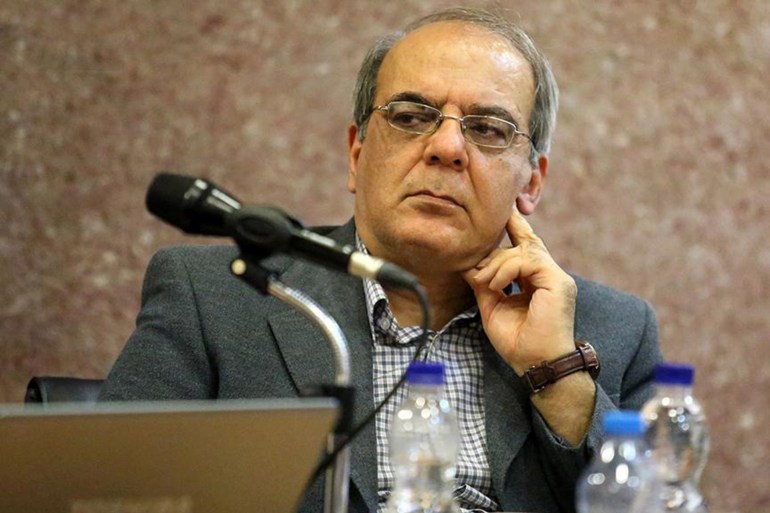A week after the launch of Twitter campaigns and popular demands to import an effective vaccine for the Coronavirus, the health authorities in Iran began the first human trials of the locally made "Coo Iran Berkit" vaccine, confirming that it will be ready next spring if it passes all the tests successfully.
Taiba Mukhabar Dezfuli, the daughter of the head of the Burkit Pharmaceutical Group, volunteered to receive the first dose of the vaccine, which greatly contributed to the satisfaction of the Iranian street. However, the announcement that the vaccine does not need the support of the World Health Organization drew a big question mark about its effectiveness.
The statements of the spokesman for the Food and Drug Administration, Kianoush Jahanpour, that "the production of the national vaccine does not need a license or endorsement from the World Health Organization, except when we decide to export it abroad" widespread criticism and described as disappointing.
Abdi asked whether the Iranian vaccine was eligible for WHO licenses (Iranian press)
The politicization of medicine
Reformist political activist Abbas Abdi, asked in a tweet on Twitter, "If the national vaccine is eligible to obtain licenses for the World Health Organization to export it?", And advised the medical authorities in his country not to tamper with the lives of the people if it is not characterized by international standards.
And vaccination with a vaccine not licensed by the World Health Organization poses a threat to the safety of the recipients, according to the specialist in infectious diseases, Dr.
Shehab Yousfi Far, who criticized what he called the Iranian authorities' failure to take practical action to import a safe vaccine for the Corona virus, which kills hundreds of Iranians daily, as he described it.
He added in an interview with Al-Jazeera Net, "There is no secret of the scientific development achieved by the medical community in Iran during the past decades, especially in the field of vaccine production and contributing to the elimination of epidemics and diseases that have spread widely and with the participation of international organizations," stressing that cooperation with health International proves the efficacy of the vaccine and its observance of international standards, and this is what the Iranians demand before vaccinating them with it.
He concluded that it is more appropriate for the health authorities in Iran not to politicize health issues and to announce that they will pursue the necessary licenses through the World Health Organization as soon as their vaccine is approved by the experts in the Ministry of Health and the Food and Drug Organization, in order to reassure the people that the national achievement is no less than its foreign counterpart and that it will not constitute Danger to their health.
Open letter
In the context, 167 Iranian pharmacists sent an open letter to the head of the Food and Drug Organization, Muhammad Reza Saneh Saz, describing the talk about producing a national vaccine against Corona virus as strange, and they asked whether the country was able to produce a vaccine for 80 million Iranians, while the government admits that it is powerless. For the provision of the necessary equipment to transport the foreign vaccine inside
In their message, the pharmacists criticized the lack of a national plan to provide the vaccine from abroad, calling for the purchase and import of an effective Corona virus vaccine before it was too late, stressing that the medical personnel were exhausted and the difficult conditions the country is going through must be remedied and the salaries of medical staff must be paid quickly.
On the other hand, Ali Mirzai, a journalist specializing in Iranian medical affairs, believes that the World Health Organization has not approved any of the anti-Coronavirus vaccines except for the "Pfizer-BioNTech" vaccine, and that the stated policy on the mouth of Jahanpur is a natural matter that China and Russia have followed from Before.
In his speech to Al-Jazeera Net, Mirzai accused Iranian parties linked to abroad to pressure the government in line with the policy of maximum pressure, stressing that the Iranian side is keen not to import the foreign vaccine before final confirmation of its quality, safety and effectiveness, not to mention that there are real fears in Iran of complications from foreign vaccines.
Import and production
With the return of popular and official demands for the necessity to import a foreign vaccine immediately to limit the spread of the Corona virus until verifying the effectiveness of the national vaccine, the government of President Hassan Rouhani has renewed its usual position that US sanctions prevent financial exchanges, stressing that it has spared no effort to secure the vaccine through a financial mechanism that avoids Penalties.
In light of the talk about disrupting the work of the Swiss channel designated for humanitarian purposes about 7 months ago, Iranian Energy Minister Reza Ardakanian confirmed after his visit to Baghdad that he had reached an understanding with it to pay Iraq for the purchase of the Corona vaccine via Iranian assets that Baghdad maintains.
After the conflicting news about Tehran importing quantities of the Chinese and Russian vaccine, the Ministry of Health announced that no load of foreign vaccines had been shipped to Iran, explaining that it was seeking to secure the vaccine by purchasing it directly and through the COVAX mechanism, in addition to producing it at home and in partnership with other countries. Foreign.
The Iranian Ministry of Health indicated that the Iranian Pasteur Institute is working with an institute in Cuba, and that their efforts to produce a vaccine for the Corona virus are undergoing the clinical testing phase, with joint production to be completed soon.

